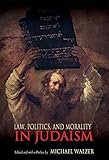Law, Politics, and Morality in Judaism / ed. by Michael Walzer.
Material type: TextSeries: Ethikon Series in Comparative EthicsPublisher: Princeton, NJ : Princeton University Press, [2009]Copyright date: ©2006Edition: Course BookDescription: 1 online resource (224 p.)Content type:
TextSeries: Ethikon Series in Comparative EthicsPublisher: Princeton, NJ : Princeton University Press, [2009]Copyright date: ©2006Edition: Course BookDescription: 1 online resource (224 p.)Content type: - 9780691125084
- 9781400827206
- 296.382
- KBM524.14.L39 2006
- online - DeGruyter
- Issued also in print.
| Item type | Current library | Call number | URL | Status | Notes | Barcode | |
|---|---|---|---|---|---|---|---|
 eBook
eBook
|
Biblioteca "Angelicum" Pont. Univ. S.Tommaso d'Aquino Nuvola online | online - DeGruyter (Browse shelf(Opens below)) | Online access | Not for loan (Accesso limitato) | Accesso per gli utenti autorizzati / Access for authorized users | (dgr)9781400827206 |
Frontmatter -- Contents -- Preface -- Part I. Political Order and Civil Society -- 1 Obligation: A Jewish Jurisprudence of the Social Order -- 2 Judaism and Civil Society -- 3 Civil Society and Government -- 4 Autonomy and Modernity -- Part II. Territory, Sovereignty, and International Society -- 5 Land And People -- 6 Contested Boundaries: Visions Of A Shared World -- 7 Diversity, Tolerance, And Sovereignty -- 8 Responses To Modernity -- 9 Judaism And Cosmopolitanism -- Part III. War and Peace -- 10 Commanded And Permitted Wars -- 11 Prohibited Wars -- 12 Judaism And The Obligation To Die For The State -- Contributors -- Index
restricted access online access with authorization star
http://purl.org/coar/access_right/c_16ec
Jewish legal and political thought developed in conditions of exile, where Jews had neither a state of their own nor citizenship in any other. What use, then, can this body of thought be today to Jews living in Israel or as emancipated citizens in secular democratic states? Can a culture of exile be adapted to help Jews find ways of being at home politically today? These questions are central in Law, Politics, and Morality in Judaism, a collection of essays by contemporary political theorists, philosophers, and lawyers. How does Jewish law accommodate--or fail to accommodate--the practice of democratic citizenship? What range of religious toleration and pluralism is compatible with traditional Judaism? What forms of coexistence between Jews and non-Jews are required by shared citizenship? How should Jews operating within halakha (Jewish law) and Jewish history judge the use of force by modern states? The authors assembled here by prominent political theorist Michael Walzer come from different points on the religious-secular spectrum, and they differ greatly in their answers to such questions. But they all enact the relationship at issue since their answers, while based on critical Jewish texts, also reflect their commitments as democratic citizens. The contributors are Michael Walzer, David Biale, the late Robert M. Cover, Menachem Fisch, Geoffrey B. Levey, David Novak, Aviezer Ravitzky, Adam B. Seligman, Suzanne Last Stone, and Noam J. Zohar.
Issued also in print.
Mode of access: Internet via World Wide Web.
In English.
Description based on online resource; title from PDF title page (publisher's Web site, viewed 30. Aug 2021)


